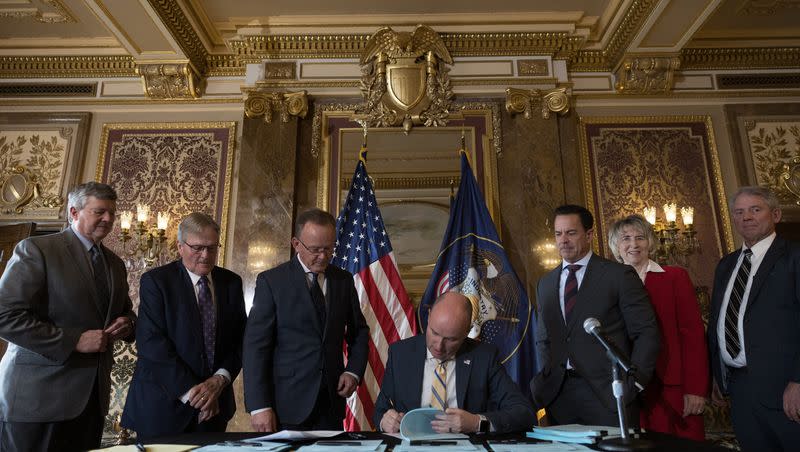Utah governor signs 'historic' $400M tax cut

- Oops!Something went wrong.Please try again later.
Utah Gov. Spencer Cox signed a series of bills on Wednesday to finalize a $400 million tax cut, including decreasing the state's income tax rate from 4.85% to 4.65%.
The income tax cut accounts for $208 million of the Legislature's tax relief, which amounts to around $208 in annual savings for an average family of four making $80,000 per year.
The tax cut is the largest in state history and includes a further cut by removing the state portion of sales tax on food — but that part is contingent on voters approving a constitutional amendment in 2024.
"It's not often when you've been a state for over 120 years that you get to do things that are really historic, and today is one of those truly historic days," Cox said during a ceremonial signing in the Gold Room at the Capitol.
"It's not just in one area; it's in lots of different areas that will benefit every person in our state in some way," Cox said of the tax cut. "We know that there are many that are struggling to make ends meet. They will be helped by this."
Cox urged voters to approve the constitutional amendment that would loosen the earmark that reserves income tax revenue for public education.
"I just want to use this moment to encourage the people of Utah to vote to remove the sales tax on food," he said. "I think that this is good for everyone, especially those who are struggling to make ends meet."
The tax package signed by Cox in HB54 also expands the Social Security tax credit to people earning up to $75,000 per year, allows pregnant women to claim a double dependent exemption for children the year they are born, and increases the earned income tax credit from 15% to 20% of the federal tax credit.

Senate President Stuart Adams, R-Layton, also praised the record spending by the Legislature for education, among other things, while still prioritizing tax relief.
"We've said 2023 was going to be the year of the tax cut again and again and again," he said. "But behind each one of these tax cuts is a record effort in spending. It's pretty amazing that you're able to cut taxes. A lot of states do that. A lot of legislatures do that. But to be able to fund services — record spending for education, record spending for infrastructure, record spending for housing, record spending for almost everything — be able to provide the services that the state needs and to be able to cut taxes, what a great honor to be able to serve with so many great people who do that great service in the state of Utah."
"There's plenty of things we could have found to put the money into, but ... I think all of us believe that the reward for that incredibly hard work for the citizens of the state of Utah would be to let them keep more of their own hard-earned money in their own pockets and choose to spend it on things that matter to them," said House Speaker Brad Wilson, R-Kaysville.
Critics of the tax reduction have argued that it would primarily benefit higher earners, but Rep. Steve Eliason, R-Sandy, the sponsor of HB54, said the Social Security and earned income tax credits would benefit lower- and middle-income earners.
"We attempted to strike a balance," he told the Deseret News earlier this month.
The Senate passed the bill 22-6 and the House 50-11, though Democrats voted against it, saying they opposed combining the sales tax on food repeal with the rest of the bill, while negotiations over the constitutional amendment were still ongoing.

